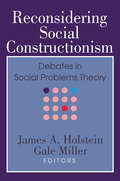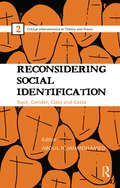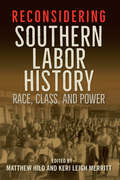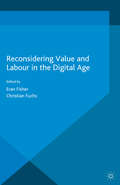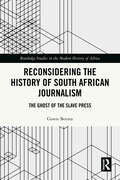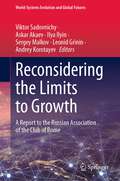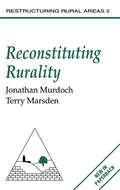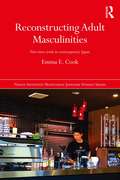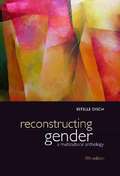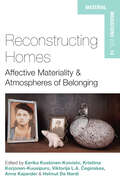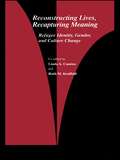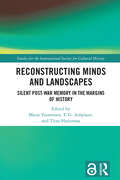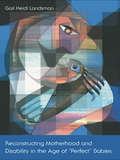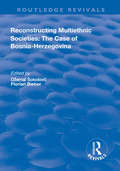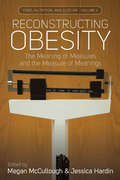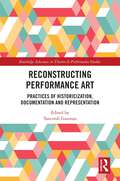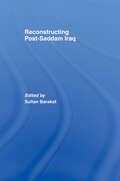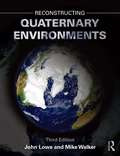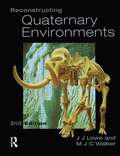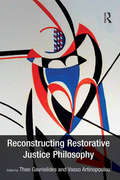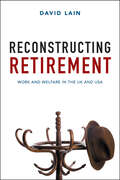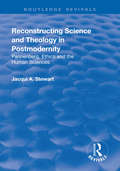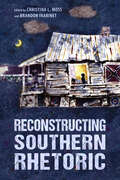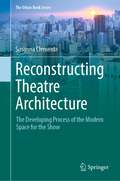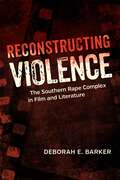- Table View
- List View
Reconsidering Social Constructionism: Social Problems and Social Issues (Social Problems And Social Issues Ser.)
by Gale MillerWith the impact of social interactionist and ethnographic methodology twenty-five years ago, the research agenda in social problems began to shift its focus, giving rise to the Social Constructionism movement. The present volume and the related shorter text, Constructionist Controversies, review the substantial contributions made by social constructionist theorists over that period, as well as recent debates about the future of the perspective. These contributions redefine the purpose and central questions of social problems theory and articulate a research program for analyzing social problems as social constructions. A generation of theorists has been trained in the constructionist perspective and has extended it through numerous analyses of diverse aspects of contemporary social life.The debates in this volume pose fundamental questions about the major assumptions of the perspective, the ways in which it is practiced, and the purposes of social problems theory. Their point of departure is Ibarra and Kitsuse's essay, cutting new theoretical ground in calling for ""investigating vernacular resources, especially rhetorical forms, in the social problems process.""Contributors are forceful proponents both within and outside of the social constructionist community, who take a broad array of positions on the current state of social problems theory and on the rhetorical forms that need exploring. They also lay down the general lines for diverse and often competing programs for the future development of the constructionist agenda.
Reconsidering Social Identification: Race, Gender, Class and Caste (Critical Interventions In Theory And Praxis Ser.)
by Abdul R. JanMohamedThis volume investigates how four socially constructed identities (race, gender, class and caste) can be rethought as matrices designed to accumulate various kinds of socio-economic values and to translate and transfer these values from one group to another. Essays in the anthology also attempt to compare the mechanisms deployed by various groups to consolidate identificatory investments. Drawn mainly for the fields of literary and cultural studies, the essays are grouped in four categories. Essays collected under ‘Theoretical Approaches’ scrutinize the relative value of various approaches; those collected under ‘Considerations of Race, Gender, and Sexual Orientation’ examine the interaction between these three categories in formation of identities; those grouped under ‘Comparative Analysis of African-American and Dalit Writing’ provide comparative analyses of the literary productions of these two oppressed groups; and, finally, those under ‘The Persistence of Racialized Perceptions’ focus on the role of ideologically inflected perception of European colonizers and the persistence of such perception in the categorization and treatment of colonial migrants to the metropolis.
Reconsidering Southern Labor History: Race, Class, and Power
by Matthew Hild and Keri Leigh MerrittUnited Association for Labor Education Best Book Award The American Dream of reaching success through sheer sweat and determination rings false for countless members of the working classes. This volume shows that many of the difficulties facing workers today have deep roots in the history of the exploitation of labor in the South. Contributors make the case that the problems that have long beset southern labor, including the legacy of slavery, low wages, lack of collective bargaining rights, and repression of organized unions, have become the problems of workers across the country. Spanning nearly all of U.S. history, the essays in this collection range from West Virginia to Florida to Texas. They examine vagrancy laws in the early republic, inmate labor at state penitentiaries, mine workers and union membership, and strikes and the often-violent strikebreaking that followed. They also look at pesticide exposure among farmworkers, labor activism during the civil rights movement, and foreign-owned auto factories in the rural South. They distinguish between different struggles experienced by women and men, as well as by African American, Latino, and white workers. The broad chronological sweep and comprehensive nature of Reconsidering Southern Labor History set this volume apart from any other collection on the topic in the past forty years. Presenting the latest trends in the study of the working-class South by a new generation of scholars, this volume is a surprising revelation of the historical forces behind the labor inequalities inherent today. Contributors: David M. Anderson | Deborah Beckel | Thomas Brown | Dana M. Caldemeyer | Adam Carson | Theresa Case | Erin L. Conlin | Brett J. Derbes | Maria Angela Diaz | Alan Draper | Matthew Hild | Joseph E. Hower | T.R.C. Hutton | Stuart MacKay | Andrew C. McKevitt | Keri Leigh Merritt | Bethany Moreton | Kristin O’Brassill-Kulfan | Michael Sistrom | Joseph M. Thompson | Linda Tvrdy
Reconsidering Value and Labour in the Digital Age (Dynamics of Virtual Work)
by Christian Fuchs Eran FisherThis volume explores current interventions into the digital labour theory of value, proposing theoretical and empirical work that contributes to our understanding of Marx's labour theory of value, proposes how labour and value are transformed under conditions of virtuality, and employ the theory in order to shed light on specific practices.
Reconsidering the History of South African Journalism: The Ghost of the Slave Press (Routledge Studies in the Modern History of Africa)
by Gawie BotmaThe concept of the “free press” is often celebrated as the vehicle which finally brought freedom of speech and democracy to post-apartheid South Africa, but historically, the position of the press was more complicated.This book dives into the history of slavery at the Cape between 1800 and 1838, reflecting on the fact that several founding journalists and printers were slave owners themselves and advertised slaves as regular “property” in their publications. The book presents an inclusive history of the founding of colonial newspapers and magazines, driven by the question of how we in the 21st century should make sense of the role that newspapers and journalism played at key points in the history of slavery and its aftermath. The “slave press” was a label originally attached to The Cape Town Gazette and African Advertiser when it was founded by a pair of well-connected private British slave traders.This book challenges us to confront the ghost of the slave press, and to consider the complicated history of press freedom in South Africa. This important book will be of interest to scholars and students of journalism and media history, in South Africa and beyond.
Reconsidering the Limits to Growth: A Report to the Russian Association of the Club of Rome (World-Systems Evolution and Global Futures)
by Leonid Grinin Andrey Korotayev Ilya Ilyin Askar Akaev Viktor Sadovnichy Sergey MalkovEchoing the famous "The Limits to Growth" report from 1972, this edited volume analyses the changes that the World System has undergone to the present, on the fiftieth anniversary of the original report. During the past fifty years, both the concept and understanding of these limits have significantly changed. This book highlights that the evolution of the World System has approached a new critical milestone, moving into a fundamentally new phase of historical development, when the old economic and social technologies no longer work as efficiently as before or even begin to function counterproductively, which leads the World System into a systemic crisis. The book discusses the transition of human society to a new phase state, the shape of which has not yet been determined. New approaches are needed for both, for the analysis of the global situation, and for forecasts. The book is based on an integrated approach including the world-systems, historical and evolutionary perspectives, as well as a systematic view of society, in which changes in one subsystem cause transformations in others. Through mathematical modeling, it defines the main vectors of transformations of the World System; makes a detailed forecast of the development of all the main subsystems of the society and the World System, while presenting horizons of changes from short-term to ultra-long-term; and presents different development scenarios as well as recommendations on how to achieve a transition to the most favorable scenario. The book will appeal to members and followers of the Club of Rome, policy-makers, as well as to scholars from various disciplines interested in a better understanding of the World System evolution, global futures, development studies, climate change, and future societies.
Reconstituting Rurality
by Jonathan Murdoch Terry MarsdenThe second in the "Restructuring Rural Areas" series, this work presents an examination of the way in which the rural, and the concept of rurality is being reconstructed within urban regions.; It argues that the rural is not a fixed category but the outcome of political, economic and socio- cultural pressures. These pressures are exacerbated in southeast England - an area dominated by London and the patterns of growth associated with that city. Through close analysis of key land development processes and a series of village studies, the authors give a forceful demonstration of the way in which certain social groups are becoming increasingly influential in determining the material and social shape of rural areas in the United Kingdom. The formation of class identity, it is argued, is closely bound up with the formation of certain local spaces; class and space must be considered as combined elements in the development of rural locales. To illustrate this the authors document in detail the means by which dominant groups represent themselves within the development process and show how the exclusion of certain kinds of development leads to the exclusion of certain social groups.
Reconstructing Adult Masculinities: Part-time Work in Contemporary Japan (Nissan Institute/Routledge Japanese Studies)
by Emma CookOver the past two decades, Japan’s socioeconomic environment has undergone considerable changes prompted by both a long recession and the relaxation of particular labour laws in the 1990s and 2000s. Within this context, "freeters", part-time workers aged between fifteen and thirty-four who are not housewives or students, emerged into the public arena as a social problem. This book, drawing on six years of ethnographic research, takes the lives of male freeters as a lens to examine contemporary ideas and experiences of adult masculinities. It queries how notions of adulthood and masculinity are interwoven and how these ideals are changing in the face of large-scale employment shifts. Highlighting the continuing importance of productivity and labour in understandings of masculinities, it argues that men experience and practice multiple masculinities which are often contradictory, sometimes limiting, and change as they age and in interaction with others, and with social structures, institutions, and expectations. Providing a fascinating alternative to the stereotypical idea of the Japanese male as a salaryman, this book will be of huge interest to students and scholars of Japanese culture and society, social and cultural anthropology, gender and men's studies.
Reconstructing Gender: A Multicultural Anthology
by Estelle DischReconstructing Gender is an anthology that addresses the contemporary experiences from a variety of women and men. Drawing from a wide range of sources including research articles, critical essays, and personal narratives, Disch has chosen accessible, engaging, and provocative readings that represent many perspectives and experiences. Eleven part-opening introductions identify important issues in the general field of study, describe the readings, remind the reader about some of the central themes emerging throughout the book, and raise questions for students to consider.
Reconstructing Homes: Affective Materiality and Atmospheres of Belonging (Material Mediations: People and Things in a World of Movement #15)
by Eerika Koskinen-Koivisto, Kristiina Korjonen-Kuusipuro, Viktorija L.A. Čeginskas, Anna Kajander Helmut De NardiIn the practice of constructing the idea of home and the emotions surrounding it, sensory experiences and materiality intertwine to form layers of memory and affective atmospheres. People in different life stages and situations create continuity and a sense of home by engaging with materiality and objects in their own unique way. Reconstructing Homes takes on a multidisciplinary approach of sensory ethnography, visual methods and autoethnography methodologies to explore affective engagements with materiality in the context of home and the idea of belonging.
Reconstructing Lives, Recapturing Meaning: Refugee Identity, Gender, and Culture Change
by Linda A. Camino Ruth M. KrulfeldReconstructing Lives, Recapturing Meaning presents the first systematic investigation of refugees' loss of their old identities and their efforts to construct new ones. Edited by the Chair and Vice Chair of the Committee on Refugee Issues (CORI) of the American Anthropological Association, it critically examines the interplay between cultural, ethnic, and gender constructions among resettled refugee populations. Each chapter is grounded in anthropological theory and method, and the book's framework demonstrates the relationship between the dynamics of forced migration and the ways in which ethnic and gender identities are reinvented in new socio-cultural settings. Unanimous in their perception of boundary maintenance as central to identity formation, these essays allow readers to view refugee resettlement as a creative, experimental process.
Reconstructing Minds and Landscapes: Silent Post-War Memory in the Margins of History (Studies for the International Society for Cultural History)
by T. G. Ashplant Marja Tuominen Tiina HarjumaaMental and material reconstruction was an ongoing process after World War II, and it still is. This volume combines a detailed treatment of post-war cultural reconstruction in Finnish Lapland – a region on the geographical and historical margins of its nation-state – with comparative case studies of silent post-war memory from other European countries The contributors shed light on key aspects of cultural reconstruction generally: disruptions of national narratives, difficulties of post-war cultural demobilisation, sites of memory, visual narratives of post-war reconstruction, and manifestations of trans-generational experiences of cultural reconstruction. Exploration of the less conspicuous aspects of mental reconstruction reveals various forms of post-war silence and silencing which have halted or hindered different groups of people in their mental return to peace. Rather than focusing on the “executive level” of material reconstruction, the volume turns its gaze towards those who experienced the return to peace in the mental, societal, and historical margins: members of ethnic, religious, and cultural minorities, women, and children. The chapters draw on archival and other original sources, personal memories, autobiographical interpretations, and academic debate. The volume is relevant for scholars and advanced students in the fields of cultural history, art history, and cultural studies.
Reconstructing Motherhood and Disability in the Age of Perfect Babies
by Gail LandsmanExamining mothers of newly diagnosed disabled children within the context of new reproductive technologies and the discourse of choice, this book uses anthropology and disability studies to revise the concept of "normal" and to establish a social environment in which the expression of full lives will prevail.
Reconstructing Multiethnic Societies: The Case of Bosni-Herzegovina (Routledge Revivals)
by Florian Bieber Džemal SokolovićThis title was first published in 2001. A range of views on the challenges of the social, political, legal and psychological reconstruction of bosnian society are presented in this volume. It draws on the knowledge and experiences of scholars and practitioners from Bosnia-Herzegovina and internationally, and presents an analysis of the Bosnian case as an example for the study of other mulit-ethnic societies emerging from war. By combining a theoretical analysis of multi-ethnic societies with practical examples, the book hopes to highlight the complexities and sensitivities of a political system in a multi-ethnic state, especially in a post-war setting.
Reconstructing Obesity
by Jessica A. Hardin Megan B. McculloughIn the crowded and busy arena of obesity and fat studies, there is a lack of attention to the lived experiences of people, how and why they eat what they do, and how people in cross-cultural settings understand risk, health, and bodies. This volume addresses the lacuna by drawing on ethnographic methods and analytical emic explorations in order to consider the impact of cultural difference, embodiment, and local knowledge on understanding obesity. It is through this reconstruction of how obesity and fatness are studied and understood that a new discussion will be introduced and a new set of analytical explorations about obesity research and the effectiveness of obesity interventions will be established.
Reconstructing Performance Art: Practices of Historicisation, Documentation and Representation (Routledge Advances in Theatre & Performance Studies)
by Tancredi GusmanThis book investigates the practices of reconstructing and representing performance art and their power to shape this art form and our understanding of it. Performance art emerged internationally between the 1960s and 1970s crossing disciplinary boundaries between performing arts and visual arts. Because of the challenge it posed to the ontologies and paradigms of these fields, performance art has since stimulated an ongoing debate on the most appropriate means to document, preserve and display it. Tancredi Gusman brings together international scholars from different disciplinary fields to examine methods, media, and approaches by which this art form has been represented and (re)activated over time and its transnational history reconstructed. Through contributions and case studies spanning various countries, regions and artistic fields, the authors outline an innovative theoretical-methodological framework for capturing the processes and strategies for transmitting the tangible and intangible heritage of performance art. This book will be of great appeal to students, researchers, and practitioners in the fields of Theatre and Performance Studies as well as Visual Arts and Art History, who have an interest in performance art, its history and presence in the contemporary artistic and cultural landscape.
Reconstructing Post-Saddam Iraq (ISSN)
by Sultan BarakatPreviously published as a special issue of Third World Quarterly, this volume seeks to analyze to what extent the controversial US policy of democratizing the Middle East with pre-emptive invasions was justified or effective. Post 9/11 the US developed a policy of War on Terror, taking the decision to democratize the Middle East with pre-emptive in
Reconstructing Quaternary Environments
by J. John Lowe Michael J.C WalkerThis third edition of Reconstructing Quaternary Environments has been completely revised and updated to provide a new account of the history and scale of environmental changes during the Quaternary. The evidence is extremely diverse ranging from landforms and sediments to fossil assemblages and geochemical data, and includes new data from terrestrial, marine and ice-core records. Dating methods are described and evaluated, while the principles and practices of Quaternary stratigraphy are also discussed. The volume concludes with a new chapter which considers some of the key questions about the nature, causes and consequences of global climatic and environmental change over a range of temporal scales. This synthesis builds on the methods and approaches described earlier in the book to show how a number of exciting ideas that have emerged over the last two decades are providing new insights into the operation of the global earth-ocean-atmosphere system, and are now central to many areas of contemporary Quaternary research. This comprehensive and dynamic textbook is richly illustrated throughout with full-colour figures and photographs. The book will be of interest to undergraduates, postgraduates and professionals in Earth Science, Environmental Science, Physical Geography, Geology, Botany, Zoology, Ecology, Archaeology and Anthropology
Reconstructing Quaternary Environments
by J.J. Lowe M.J.C. WalkerExamines the various forms of evidence used to establish the history and scale of environmenal changes during the Quaternary. The evidence is extremely diverse, ranging from landforms and sediments to fossil assemblages and isotope ratios, bringing the book fully up to date since its last publication.
Reconstructing Restorative Justice Philosophy
by Theo Gavrielides Vasso ArtinopoulouThis book takes bold steps in forming much-needed philosophical foundations for restorative justice through deconstructing and reconstructing various models of thinking. It challenges current debates through the consideration and integration of various disciplines such as law, criminology, philosophy and human rights into restorative justice theory, resulting in the development of new and stimulating arguments. Topics covered include the close relationship and convergence of restorative justice and human rights, some of the challenges of engagement with human rights, the need for the recognition of the teachings of restorative justice at both the theoretical and the applied level, the Aristotelian theory on restorative justice, the role of restorative justice in schools and in police practice and a discussion of the humanistic African philosophy of Ubuntu. With international contributions from various disciplines and through the use of value based research methods, the book deconstructs existing concepts and suggests a new conceptual model for restorative justice. This unique book will be of interest to academics, researchers, policy-makers and practitioners.
Reconstructing Retirement: Work and Welfare in the UK and USA
by David Dr LainRetirement is being ‘reconstructed’, with the UK following the US path of abolishing mandatory retirement and increasing state pension ages. This timely book assesses prospects for work and retirement at age 65-plus in the UK and US. Part 1 explores the shifting ‘policy logics’ in both countries that increase both the need and opportunities to work past age 65. Part 2 presents an original comparative statistical analysis on the wide range of factors influencing employment at this age. Part 3 proposes a series of policies across the life-course that would promote security and autonomy for older people. Pathways to employment after 65 are complex and pressures to work at this age are likely to result in very unequal outcomes. This book is essential reading for researchers, students and practitioners interested in the late careers and the future of retirement.
Reconstructing Science and Theology in Postmodernity: Pannenberg, Ethics And The Human Sciences (Routledge Revivals)
by Jacqui A. StewartThis title was first published in 2000: The author examines and critiques Pannenberg's elaboration of hermeneutics and evaluates his use of the sciences against the background of modernity. The study does not present Pannenberg's theory in itself, rather, it is confined to a critical assessment of his engagement with the sciences.
Reconstructing Southern Rhetoric (Race, Rhetoric, and Media Series)
by Christina L. Moss and Brandon InabinetContributions by Whitney Jordan Adams, Wendy Atkins-Sayre, Jason Edward Black, Patricia G. Davis, Cassidy D. Ellis, Megan Fitzmaurice, Michael L. Forst, Jeremy R. Grossman, Cynthia P. King, Julia M. Medhurst, Ryan Neville-Shepard, Jonathan M. Smith, Ashli Quesinberry Stokes, Dave Tell, and Carolyn WalcottSouthern rhetoric is communication’s oldest regional study. During its initial invention, the discipline was founded to justify the study of rhetoric in a field of white male scholars analyzing significant speeches by other white men, yielding research that added to myths of Lost Cause ideology and a uniquely oratorical culture. Reconstructing Southern Rhetoric takes on the much-overdue task of reconstructing the way southern rhetoric has been viewed and critiqued within the communication discipline. The collection reveals that southern rhetoric is fluid and migrates beyond geography, is constructed in weak counterpublic formation against legitimated power, creates a region that is not monolithic, and warrants activism and healing.Contributors to the volume examine such topics as political campaign strategies, memorial and museum experiences, television and music influences, commemoration protests, and ethnographic experiences in the South. The essays cohesively illustrate southern identity as manifested in various contexts and ways, considering what it means to be a part of a region riddled with slavery, Jim Crow laws, and other expressions of racial and cultural hierarchy. Ultimately, the volume initiates a new conversation, asking what southern rhetorical critique would be like if it included the richness of the southern culture from which it came.
Reconstructing Theatre Architecture: The Developing Process of the Modern Space for the Show (The Urban Book Series)
by Susanna ClementeThe study is aimed at reconstructing the historical process at the base of any significant theatre architecture. The modern space for the show is no longer intended as a direct derivation from classical types, but as a product of the transformation of the urban fabric in our cities. The research was conducted at the academies, state and municipal historical archives of numerous towns, in particular Rome, Milan, Mantua, Ferrara, Venice, London and Prague. All images are original. The work also includes the list of about 700 major Italian historical theatres.
Reconstructing Violence: The Southern Rape Complex in Film and Literature (Southern Literary Studies)
by Deborah E. BarkerIn this bold study of cinematic depictions of violence in the south, Deborah E. Barker explores the ongoing legacy of the "southern rape complex" in American film. Taking as her starting point D. W. Griffith's infamous Birth of a Nation, Barker demonstrates how the tropes and imagery of the southern rape complex continue to assert themselves across a multitude of genres, time periods, and stylistic modes. Drawing from Gilles Deleuze's work on cinema, Barker examines plot, dialogue, and camera technique as she considers several films: The Story of Temple Drake (1933), Sanctuary (1958), Touch of Evil (1958), To Kill a Mockingbird (1962), and Cape Fear (1962). Placing this body of analysis in the context of the historical periods when these films appeared and the literary sources on which they are based, Barker reveals the protean power of cinematic racialized violence amid the shifting cultural and political landscapes of the South and the nation as a whole. By focusing on familiar literary and cinematic texts--each produced or set during moments of national crisis such as the Great Depression or the civil rights movement--Barker's Reconstructing Violence offers fresh insights into the anxiety that has underpinned sexual and racial violence in cinematic representations of the South.
